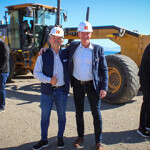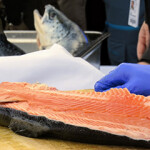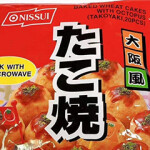Lingalaks, Framo partner on Stadion Basin flowthrough floating salmon farm

Norheimsund, Norway-based salmon farming company Lingalaks has partnered with with pump manufacturer Framo to undertake an innovative new project: the Stadion Basin, a floating, closed, flowthrough salmon production unit built in reinforced concrete.
The Stadion Basin, which measures 39 meters wide by 117 meters long, looks like a sports stadium from above, which is the inspiration for its name. It is due to be operational by 2023. Each company will have 50 percent ownership of the project, which has received Norwegian Directorate of Fisheries development licences to grow 1,849 metric tons (MT) of biomass.
“We were delighted, as a medium-sized company, to be awarded development licenses for the project, as most of the licences went to the big players,” Lingalaks CEO Kristian Botnen told SeafoodSource.
First developed as a concept by StadionLaks AS, a company owned and operated by biologist and fish farming pioneer Bjørn Myrseth and civil engineer Knut Solberg, Lingalaks took over the project in 2016. Framo, a subsidiary of heavy industry products firm Alfa Laval, was engaged to provide technical assistance for the circulation system in 2017, and decided to come on as a joint partner February 2021.
"With this collaboration we aim to increase both productivity and economic attractiveness of fish farming solutions, while reducing the impact on the environment,” Alfa Laval Marine Division President Sameer Kalra said in a press release.
Framo Innovation Director Oddbjørn Jacobsen said the project will help the company demonstrate its capabilities to the seafood industry.
“We decided to take part in this project so that we can develop and test new pump technology in the field. Our expertise lies in moving vast volumes of liquids in a controlled manner. Our goal is to be the preferred supplier of pump systems for aquaculture worldwide,” Jacobsen said.
The new facility will be sited in Hardanger fjord, and supplied with highly oxygenated water at a constant temperature, pumped up from a depth of 35 meters. The force of the water will also provide a current for the fish to swim against. To maintain the water in pristine condition, separation technology will be used to concentrate any sludge for further use as fertilizer, and provide a sustainable, circular solution to this waste stream, according to Framo.
Lingalaks currently produces around 14,000 metric tons of salmon each year, and has GlobalG.A.P. and Aquaculture Stewardship Council certifications. It exports to markets around the globe, but its focus is on the European Union and the United Kingdom.
“The Stadion Basin will address a number of issues relating to fish health and the environment, as it will reduce or eliminate challenges involving space, salmon lice, fish escapes, disease, and algal blooms, as well helping to identify better solutions for handling feed residue and waste products,” Botnen said.
Image courtesy of NagellD AS






Share